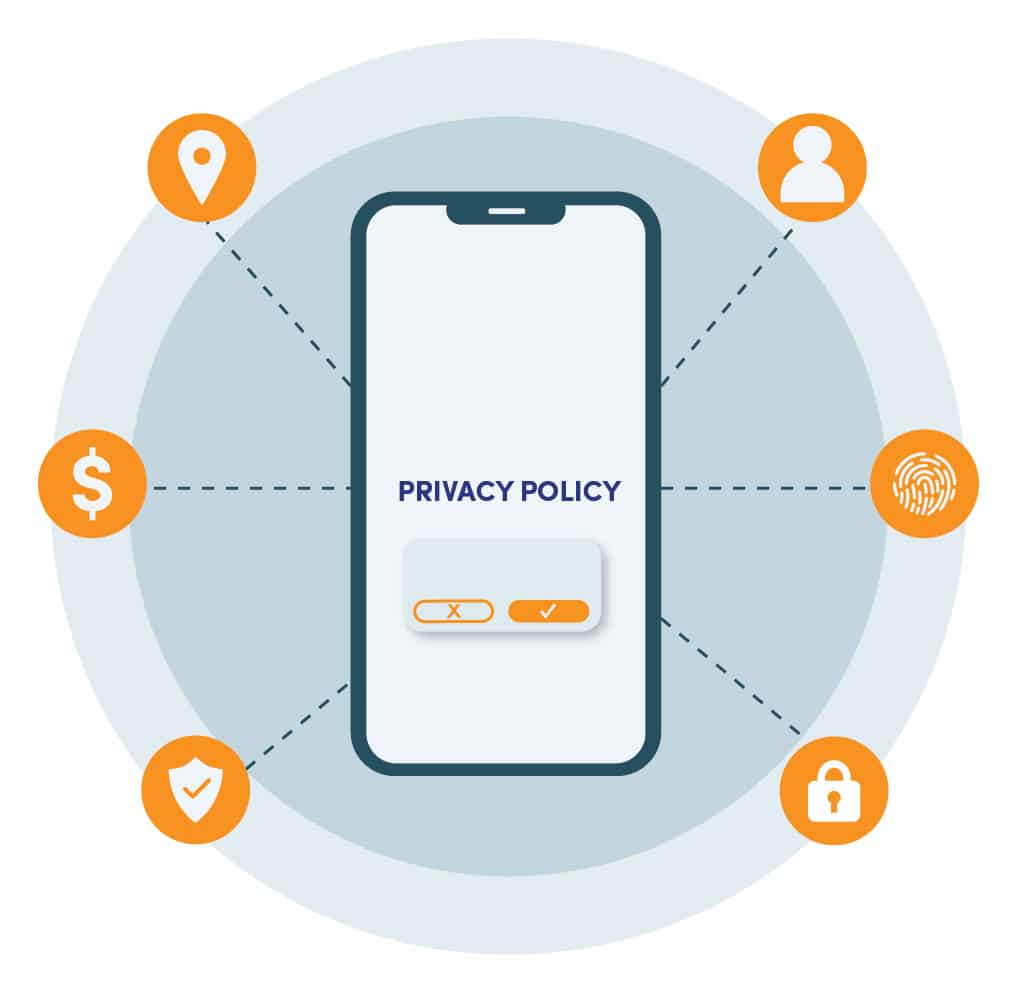What is a privacy policy?
Even if you don’t know what a privacy policy is, we bet you’ve at least encountered one. Most people see them several times every day.
And many click the ‘agree’ button without even thinking about it. It’s more or less muscle memory at this point.
Let’s start off with the basics, though:
A privacy policy is a document or text that states how your mobile app processes the personal information of the people who use it.
Personal information can be things such as:
- Names
- Phone Numbers
- Addresses
- Social security numbers
- Geolocation
- IP addresses
Your privacy policy must state what data your app collects, why you collect it, how you intend to use it, and what third parties data will be shared with.
Do I need a privacy policy for my mobile app?
You do!
In fact, it’s required by law. At least if your mobile app collects and processes personal information.
But you’ll be hard-pressed to find one that doesn’t gather personal data in one way or the other. Likewise, you also need a privacy policy to comply with the terms of service on the App Store and Google Play Store.
That means you’ll have to formulate a privacy policy if you want to publish your mobile app on one of these platforms. A quick look at the user metrics will tell you that it’s the business-savvy approach.
Can’t I just use a free privacy policy generator?
We can’t tell you what to do.
But we strongly advise against the use of free generators or templates.
Free privacy policies aren’t compliant in most cases.
You must also consider the fact that you are legally liable for the contents of whatever privacy policy you use. So, you have an interest in knowing the contents of your privacy policy and what it means.

Why is a privacy policy important?
Aside from the legal aspects, there are several reasons for privacy policies being fundamentally crucial for your mobile app.
One of those is that your users care.
Although many people seem to almost automatically click the “agree” button, the numbers paint a clear picture:
Users care about data privacy. And they care about companies that care about data privacy.
With many mobile apps being games targeted toward children, this statement becomes even more salient.
If you intend to monetize your mobile app – through programmatic advertising for example – it’s in your best interest to have a valid privacy policy.
And why is that?
Data protection authorities are pushing for stricter legislation in the app industry and large advertisers are less likely to invest in publishers that fail to collect compliant consents. You simply won’t be able to sell your data or ad space.
We think that’s a pretty good reason to put privacy at the heart of your business model, rather than it being a footnote.
Let’s dive into the practical stuff
Now you know the basics surrounding privacy policies.
So, what should you include in a privacy policy for your mobile app?
There are a few key things you should always include in your privacy policy:
- The purpose of the document
- Your contact information and address
- Information about what data your app collects, why you collect it, how you intend to use it, and what third parties data will be shared with.
- The purpose of your processing of data and the legal basis that applies.
- What data you will keep, retention periods, and information on data subject rights.
- How you ensure protection of user data.
Other aspects to consider include the language you use and where you place your privacy policy.
Language
According to the GDPR, you should write your privacy policy in “clear and plain” language.
This means that you should always avoid using legal or technical terms. To keep language clear and precise, you should also avoid using vague terms such as might, may, some, often, and so on.
Placement
When you finish up your privacy policy, it’s time to publish.
It has to be readily available for your users to read, both in your app and on the platform you publish on. It’s common to place your privacy policy in the legal section or near the “Terms & Conditions”.
It’s also good practice to include a link to your privacy policy in marketing e-mails.
Where can I get help with my mobile app privacy policy?
Right here at Cookie Information!
Our Mobile App Consent solution provides an in-app interface to gather legal consent and build trust with your users.
The solution lets you generate a custom privacy (and cookie) policy that is both legally valid and compliant within all legal frameworks.
Our Mobile App Consent supports 42 languages, so that you can reach a global audience without trouble. And it works for both iOS and Android, so you don’t have to worry about app store rejection.
With the simplified integration, you can deploy the Mobile Consent SDK directly into your existing app. That means reduced development time for you.